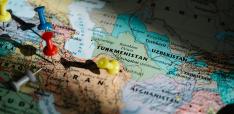Eye on the Prize - Russian Expansionism and Energy Dependency
Martha Molfetas asks - why is Russia hungry for Crimea in the first place?
This past month, Ukraine has undergone a metamorphosis, from protest and violence to creating a new government with planned referendums, and an unexpected show of military force by Russia. It seems like every time the Olympics rolls around; Russia is invading a Former Soviet Republic. In 2008, it was Georgia, now it’s Ukraine’s turn.
Ahead of planned votes intended to take place in the whole of Ukraine, the semi-autonomous and Russo-majority government of Crimea planned a referendum for succession. In the vote this weekend, nearly 97% voted overwhelmingly to join Russia. The United States and European Union have come together to push for sanctions, with the US stating that the Crimea referenda is null due to potential coercion and the threat of violence by Russia. Not to mention that the current government of Ukraine has made strides to improve itself and should be given a chance to see these new policies through.
While issues surrounding governance and post-conflict reconciliation are integral to Ukraine’s future. The bigger question is this – why is Russia hungry for Crimea in the first place? While Russia’s military far exceeds the Ukraine’s, Russia does not have the military might it once did during the Cold War. Russia could not afford economically to isolate itself from the West and Europe at large if there was a full on Russian invasion and occupation, if for no other reason than energy dependency. However, Russia does have a large number of ethnic Russians in Crimea and elsewhere in Ukraine. As we can see from the recent referendum, it is cost-effective for Russia to influence succession rather than through a show of military prowess. But the question remains, why Crimea? Russia needs energy, and needs to maintain a secure route to sell its energy. Fifty per cent of the Russian federal budget comes from energy sales. Making Russia highly reliant on oil and natural gas revenues for state survival. In the last year, Russia has fallen from number two to number three in world production of oil. Russia does remain the second largest producer of natural gas. However, Russia needs to maintain high reserves and a stable flow of energy to exist. Faced with this existential crisis, Crimea offers huge potential to Russia in offshore oil and gas reserves, would provide more ports in the Black Sea for export, and could provide a new Russian controlled pipeline route for Russian energy expansion into Europe.
In the decades since Gorbachev, Russia has become increasingly dependent on energy revenues and increasingly authoritarian. Suppressing the rights of political groups, journalists, and minority groups. An increased level of authoritarianism is closely aligned to resource dependency and poor social investment. This phenomenon is known as the resource curse. Resource curse drives imperialistic ambitions for more resource wealth while inciting conflicts and increasing draconian governance. Considering this Russian reality that is pivotal to state survival, Crimea represents a huge windfall for resource security.
In the last year, 16% of gas consumed by Europe passed through Ukraine. Thirty per cent of all gas transported through Ukraine originated in Russia. In 2009, Russia cut off gas to Ukraine in an effort to push political agendas. These cut offs impacted energy stability throughout Europe and prompted efforts to diversify European energy. In light of recent events, German energy firms are devising strategies for energy re-routing to Kiev to support Ukraine’s energy needs in the event of future gas shut offs. Russia currently supplies Ukraine with 50% of their energy demand, and Germany with 35% of their energy. There is no debate about the importance of Russian gas for Europe. While there have been advancements in renewable energy systems like solar and wind, natural gas still plays a large role for European energy consumers.
The Crimea issue may be of more importance today than if the same events occurred 50 years ago. The world is in a post-peak reality where harder to harness hydrocarbon reserves are being tapped into at growing rates, and sweeter or conventional hydrocarbon wells are running dry. Crimea offers Russia an opportunity to increase potential reserves of oil and gas while protecting vital pipelines into Europe. Unrest in Ukraine and a Russo-ethnic majority in Crimea offered an opportunity for expansion and to increase potential energy reserves. Without energy, Russia will cease to exist as a state. And with energy, Russia will continue to lack a diversified economy, continue on it’s authoritarian track, and will continue to be a wild-card in global and regional politics and security. With the potential that Crimea may fall into Russia’s hands, the international community needs to reflect on how we should cope with states affected by resource curse in a world currently running on empty.


